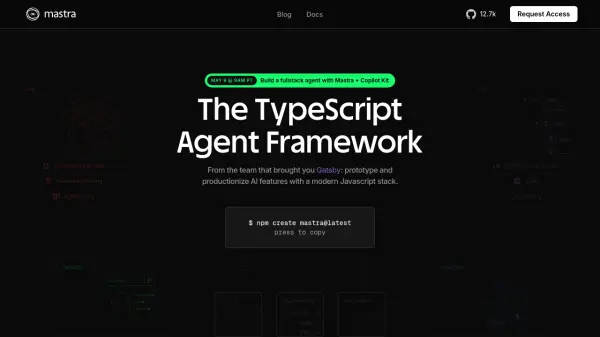What is Mastra?
Mastra is a TypeScript agent framework developed by the team behind Gatsby. It empowers developers to prototype and productionize sophisticated AI features and intelligent agents by leveraging a modern JavaScript stack. This framework is engineered to streamline the development process, making it easier to integrate AI capabilities into applications.
The platform offers comprehensive tools for building agents that can execute tasks, access knowledge bases, and maintain persistent memory. Mastra features durable, graph-based state machines known as workflows, designed to manage complex sequences of Large Language Model (LLM) operations with built-in tracing. It also incorporates advanced Retrieval Augmented Generation (RAG) capabilities, including a unified vector store and metadata filtering, alongside operational tools for performance metrics, evaluations, and debugging via OpenTelemetry.
Features
- Unified Provider APIs: Switch between AI providers like OpenAI by changing a single line of code using the AI SDK.
- Persistent Agent Memory: Combine long-term memory with recent messages for robust agent recall.
- Tool Calling: Enable agents to call custom functions, interact with external systems, and trigger real-world actions.
- Durable Workflows: Utilize graph-based state machines (built on XState) for complex LLM operation sequences with clear control flow, including branching, chaining, and merging.
- Workflow Orchestration: Suspend and resume workflow execution, monitor real-time state, and flexibly embed agents in workflows or pass workflows as tools to agents.
- Agentic RAG: Equip agents with a vector query tool to search knowledge bases, supported by a unified vector store and metadata filtering for targeted information retrieval.
- Comprehensive Ops Tools: Track inputs, outputs, and tool calls for every workflow run, measure performance metrics (accuracy, token costs, latency), conduct evaluations, and leverage OpenTelemetry tracing for debugging.
Use Cases
- Developing full-stack AI agents for various applications.
- Building multi-agent systems for complex tasks such as automated music generation or intelligent travel planning.
- Creating AI-powered notebook applications with advanced agent orchestration.
- Implementing intelligent web browsing agents capable of autonomous navigation and data extraction.
- Prototyping, deploying, and scaling custom AI features within production environments.
FAQs
-
What AI models can be used with Mastra?
Mastra features unified provider APIs, allowing developers to integrate and switch between various AI models, such as OpenAI's gpt-4o-mini, with minimal code adjustments. -
How does Mastra support complex, long-running tasks?
Mastra employs durable, graph-based workflows that can manage intricate sequences of LLM operations. These workflows support features like suspension and resumption, enabling them to handle long-running tasks and human-in-the-loop interventions. -
Can agents built with Mastra learn or remember information?
Yes, Mastra agents are designed with memory capabilities, allowing them to combine long-term memory with recent messages for more context-aware and robust recall during interactions. -
What tools does Mastra offer for monitoring and debugging AI agents?
Mastra includes comprehensive ops tools for tracking inputs, outputs, and agent decisions. It supports performance metrics, evaluations, and emits OpenTelemetry traces for efficient debugging and application performance monitoring. -
Is Mastra suitable for production deployment?
Mastra is built for both prototyping and productionizing AI features. It offers Mastra Cloud, a serverless agent platform for atomic deployments, along with robust workflow management and observability tools necessary for production environments.
Related Queries
Helpful for people in the following professions
Featured Tools
Join Our Newsletter
Stay updated with the latest AI tools, news, and offers by subscribing to our weekly newsletter.








